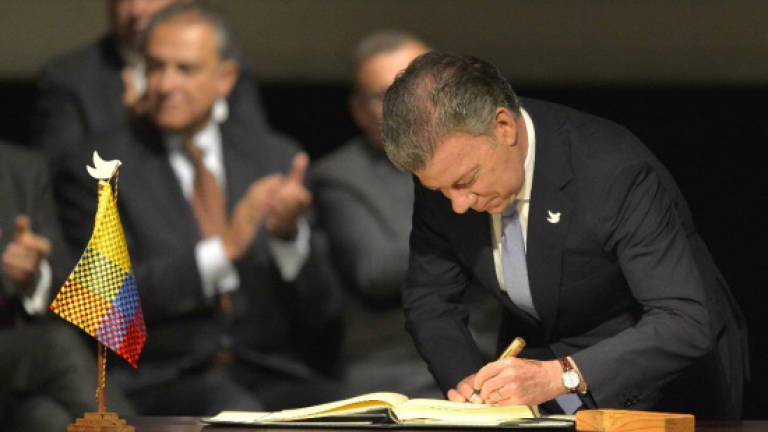Colombia signs contested new peace deal

BOGOTA: Colombia's government and FARC rebels signed a controversial revised peace accord Thursday to end their half-century conflict, set to be ratified in Congress despite bitter opposition.
President Juan Manuel Santos and guerrilla leader Rodrigo "Timochenko" Londono signed the new deal with a pen made from a spent bullet, in a low-key ceremony in the capital Bogota.
The original deal – signed with great fanfare in September – was rejected by voters in a referendum last month, a shock upset that sent negotiators back to the drawing board.
The new plan bypasses a vote by the Colombian people, against bitter opposition from critics.
They say the revisions are only cosmetic and will still grant impunity for war crimes committed by the Revolutionary Armed Forces of Colombia (FARC).
Santos, who won this year's Nobel Peace Prize for his efforts to end the conflict, said the new deal was better than the original.
"It includes the hopes and observations of the vast majority of Colombians," he said after signing.
"We all know in our souls that the cost of the armed conflict is too high."
The deal was immediately sent to Congress, where it is expected to pass after being debated next week. Santos and his allies hold a majority in the legislature.
The government and FARC both say they are under pressure for fear that their fragile ceasefire could break down.
A recent wave of alleged assassinations in conflict zones has added to calls to seal a deal fast.
But an aftermath of discord and uncertainty appears likely as opponents promised to keep resisting the peace plan, including with street protests.
"The country has spoken. It has said, 'Yes to peace, but without impunity,'" said top opponent Alvaro Uribe, a conservative ex-president.
"What we have here remains total impunity," he told RCN television.
Opposition objections
Thursday's ceremony was held at the Colon Theatre in Bogota – relatively small, with a capacity of just 800.
It was a marked change from two months ago, when 2,500 guests including 15 heads of state attended exuberant festivities for the signing of the initial deal in the Caribbean city of Cartagena.
Government and FARC negotiators presented a redrafted version of the deal earlier this month. It includes concessions from the rebels on issues such as reparations for victims.
But Uribe complains it still ignores key demands, notably on punishing FARC leaders for the many thousands of killings and kidnappings blamed on the group.
Under the deal, the Marxist rebels would disarm and become a political party.
The deal allows non-custodial "alternative" sentences for convicted FARC members.
Uribe and his allies demand tougher punishments and say rebel leaders guilty of war crimes should not be allowed to run for office before completing their sentences.
They also want guarantees for state police and soldiers who may face trial over their own actions in the conflict.
A survey by pollster Datexco published on Wednesday found that 58 percent of people want more revisions to the deal.
Bypassing voters
Congress will open a live televised debate on the deal from next Tuesday.
On the streets of Bogota, Angie Suarez, 21, a sales assistant, said it was not fair to push the deal through Congress.
"They go over our heads, as if our opinion meant nothing," she said.
But street vendor Manuel Duran, 40, thought it was "better for Congress to do it" because another referendum would "divide the country."
A two-way ceasefire between the government and FARC has been in force since August, but both sides warn it is fragile.
Santos met with top officials on Tuesday to discuss a recent wave of alleged political killings in southern conflict zones.
Separately, two FARC guerrillas were killed last week in what the authorities said was a clash with the army.
The Colombian conflict has killed at least 260,000 people and displaced seven million since it erupted in 1964, according to the authorities. — AFP